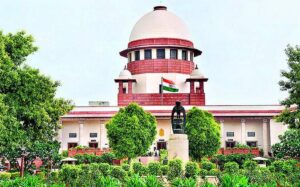
On 15thFebruary 2024, the Supreme Court of India has declared that the Electoral Bond Scheme, brought by the Prime Minister Narendra Modi led BJP government is unconstitutional.
Have not the election donations been made by political parties before the BJP-led rule from 2014? Why were those donations not challenged in the Court of Law? How does it differ from the Electoral Bond Scheme, introduced by Prime Minister Narendra Modi in 2017?
In the common public life many have been talking much in various angles about eradication of corruption but it is an undeniable truth that the fountain head of corruption is infact our electoral system itself.
To a large extent, political parties receive donations more from corporate companies rather than from individuals.
No one – especially none of the corporate companies would offer donations without the hope of reaping benefits. During the ten year long rule of the BJP headed Union government in the past, there has been an obvious attempt to make equality totally vanish, though it is one of the aspects adumbrated in the Constitution, as one of the fundamental bases. This has been done by privatising public sector organisations. This enabled those public sectors, to be sold at very low cost to affluent business magnates or let out on contract for a long term.
What exactly was the nature of the earlier election donations?
* Earlier only the corporates that earned net profit consecutively for 3 years could donate to political parties of their preference. There was a ceiling of 7.5 per cent of the net profit as donation.
* Donation made had to be diverted to a separate donation trust from where it had to be passed on. The source and means of donations were subject to accounting and auditing.
Prior to 2014 election, the BJP stressed that there must be transparency and credibility in every financial transaction made. The following prevailing conditions constraint, the routine business transactions.
a) As per the prevailing financial legislations, any donation amount by any trust exceeding Rs.2,000/- will not be exempted under Sec.80G of the Income Tax Act.
b) Cash donations exceeding Rs.2 lakhs even to close relatives of the donors will attract 100 percent penalty.
c) If a businessman or professional receives cash donation worth Rs.2 lakhs or above they will be levied 100 percent penalty.
But there is no restriction as above for the donations made through the Electoral Bond Scheme.
The new Electoral Bond Scheme was announced in the Union budget for 2017-18.
Introduction as Finance Bill:
The BJP introduced the Electoral Bond Bill in the Lok Sabha as a Finance Bill that need not be discussed by the members. Mere passing of the Bill with the available majority in the Lok Sabha alone is sufficient. The passed Bill will come to effect, even if it is not passed in the Rajya Sabha. The introduction itself negates the democratic principles of expressing, the opposing views.
The authorities concerned had raised objections amending to the following Acts. (1) Reserve Bank of India Act, 1934, (2) The People’s Representation Act, 1951, (3) Income Tax Act, 1961, (4) Companies Act, 1956. Ignoring all the objections, the Union Government incorporated several amendments suitable for it. By the release of these Electoral Bonds, several crores of rupees have been collected as donations. All the rules and regulations that existed in the past have been thrown overboard. The 7.5 per cent ceiling has also vanished. The earlier legal procedures to determine if a company is a profit yielding one or a sick unit have also been discarded. Even a loss incurring, just started company or even a shell company can contribute through the Electoral Bond Scheme.
Earlier, there was a restriction that foreign companies cannot offer donations to political parties in India. This restriction has also been removed. A new amendment allows overseas companies to offer unlimited sums as donation. As already pointed out, RBI had clearly – conveyed to the Union Government, the reasons for its objections. The Election Commission had also clearly stated in its objection that the Electoral Bond Scheme lacks transparency. But the Union Government headed by Modi has ignored all the objections.
The Income Tax Department had also warned that sick units could try to get favours of the Union Government by obtaining electoral bonds, spending their black money as donation. The IT department cautioned that the consequences would be disastrous if there is such exploitation by sick units. But the Government headed by Modi has not bothered about the alert of the IT Department.
No transparency in the Bond:
Under the Electoral Bond Scheme, any individual or Corporate can purchase the Bond of any denomination in multiples of Rs.1,000/-, Rs.1,00,000/-, Rs.10,00,000/- and Rs.100,00,000/- without any ceiling. The donor can purchase the Bond from anyone of the specified branches of State Bank of India. In the Bond, there is no mention of the name and details of the donor and also the name of the political party (donee). It is like a promissory note payable to the bearer on demand. In this process the details of the donor and the donee are completely concealed. The purchased Bond need not be donated only by its purchaser; it can be transferred to any number of persons / corporates prior to donating ultimately to political party. The political party (donee) need not be the one and the same, as decided at the time of purchasing the Bond. The choice of beneficiary may be changed at the will of the donor.
There will not be any scope as such in writing for the political party (donee) to know who has donated it. The nature of the scheme is that there is no need for that political party to know about the donor.The donee (political party) has to simply present the donated.Bond for the follow up credit by its authorised account with State Bank of India.
The Government of India notifies the Scheme of Electoral Bond to cleanse the system of political funding in the country.
The following organisations/political paries moved the Supreme Court filing separate writs against the Electoral Bond Scheme:
1) Association for Democratic Reforms
2) Communist Party of India (Marxist)
3) Congress Party’s executive Jaya Thakur
The writ petitions were heard by the Constitution Bench comprising five judges. The Chief Justice of India D.Y.Chandrachud with Justices Sanjeev Khanna, B.R. Gavai, J.P.Pardiwala and Manoj Misra heard the case. They unanimously delivered the landmark verdict that the donations received through the electoral bonds are all null and void and unacceptable.
It is reported that from March 2018 upto January 2024 a sum of Rs.16,518.11 crore have been received as donations through the electoral bonds. The value of the electoral bonds pertaining to the BJP is said to be Rs.6,568 crore. During the financial year 2022-2023, the gross earnings of the BJP is Rs.2,360 crore. Out of this, Rs.1,300 crore has been collected through the electoral bonds alone.
Most of the electoral bonds sold are of the maximum value of Rs.One Crore. Why would anyone donate such huge amounts to political parties without expecting benefits in return? Since, these secretive contributions are concealed, it would only be beneficial to the ruling Union Government. These electoral bonds would be advantageous to it.
The Union Government has further expressed its stand that the Corporate Companies need not state the details of their donations even in their account statements of income and expenditure. The Supreme Court has rejected this stand as unacceptable.
In its landmark verdict, the Supreme Court has firmly stated that the Constitution would not be a silent spectator to the maladministration of the Union Government. The Supreme Court has made it clear that misuse of any law by the rulers in power would not be tolerated. It has also specified that improper use of existing norms and regulations would never be entertained.







